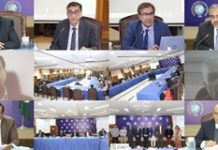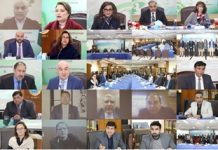If anyone is serious and sincere about national reconciliation, the true message and real essence of the South African process needs to be imbibed and applied to Pakistan
For a while now, some functionaries of President Pervez Musharraf’s regime have been talking about national reconciliation, highlighting the importance of burying the bitter past and moving ahead. This is good. However, this talk has mostly remained confined to occasional, off-the-cuff comments. While identifying an important step, they have evaded important primary questions about the agenda and objectives of reconciliation, as also the structures and plan of such a process.
It has become normal practice now that those in power randomly pick up themes and subjects from other societies and try to apply them to Pakistan, not to effect any positive, meaningful change but just to look good in the media and show to the outside world that they have a great project for social change. Before national reconciliation, the regime picked up the theme of “enlightened moderation”, trying to make us believe that the concept which is associated with constitutionalism and democracy can in fact be the ideology of a military regime that has been violating every constitutional norm to stay in power.
It is interesting that national reconciliation comments have been made around the time when the media reported that the regime and the Pakistan People’s Party were engaged in backroom negotiations about how the two could cooperate and share power. It makes good propaganda to characterise a secretive political deal as “national reconciliation” because of the history of acrimonious and hostile political relations between the Musharraf regime and the PPP: for years, Bhutto and Musharraf exchanged spiteful and harsh words.
The concept of national reconciliation as applied by the racial majority in South Africa has earned global respect. National reconciliation will be good for Pakistan but it cannot be an alliance between two or more political groupings.
Consider the South African experiment.
After the end of the inhumane Apartheid regime, the successor government formed by the African National Congress did not resort to retribution against its former tormentors. Instead, it decided to forgive the crimes of the functionaries of the former regime. It did so through a national Truth and Reconciliation Commission that hauled up the offenders and gave them an opportunity to vindicate themselves or seek apology. The crimes they had committed were personal and communal in nature. The objective of this exercise was to create a new composite South African nation that would rest on constitutionalism and citizenship rights.
It is unfortunate that such a highly respected concept is being misused to give cover to drawing-room deals between the military and the traditional political elites of the country. If anyone is serious and sincere about national reconciliation, the true message and real essence of the South African process need to be imbibed and applied to Pakistan. Not many are convinced that this is the objective of the Musharraf regime. It uses the idea of national reconciliation in the same fashion as it justifies its every illegal act as legal and constitutional.
Let us outline what national reconciliation would mean if properly applied in Pakistan. First, the regime and all the political parties must pledge to honour the constitution. A constitution disfigured by some of the political parties and an individual who captured power through a coup may not meet the criterion of constitutionalism. National reconciliation would become a farce if it does not reflect constitutional values.
The second requirement for national reconciliation, the most critical perhaps, is that we must end the role of the military and intelligence agencies in politics. A new politics of national reconciliation will be possible only with the civilianisation of power structures in the country i.e. the transfer of power from the military-dominated, elite-crusted establishment to genuine representatives of the people.
The third requisite for national reconciliation is that it must focus on addressing the grievances of ethnic groups, human rights violations and military operations in Balochistan and the tribal regions. We know the difficulties of negotiating with the individuals and groups that have taken up arms against the state. But how can national reconciliation be seriously considered if such groups are excluded and negotiations among the elites focus only on sharing the spoils of political power.
Fourth, national reconciliation can be credible and effective if and when the process is truly inclusive and involves every party and group. The objective of including everyone should be to draw a new social contract based on the first two conditions, namely constitutionalism and rolling back of the military for good. At present, the political attitudes of the regime are partial and discriminatory. There is a shocking contrast that one of the two former prime ministers is deported disregarding a clear decision of the apex court, while it quietly facilitates a grand reception for another. This would not be possible without a deal. Let us clarify that political deals are a normal affair and are legitimate political transactions, driven by self-interest, between a ruling group and opposition parties. But the question is: can deals be substituted for national reconciliation?
Finally, the credibility of those who initiate national reconciliation is an important consideration for its social acceptance for the danger is that they might reduce it to a narrow bargain to provide crutches to a shaky regime which the people do not trust any more. Its every step is seen in bad faith because of the huge credibility gap and trust deficit.
There is a fear that what is being labelled national reconciliation is actually a settlement among selective elite groups and a military ruler. Contrary to this, national reconciliations are born in the national consciousness and in good intention to forget the past and march into the future with a new social contract.
It is not for the first time that a new realignment among various elite groups is taking place. With each new cycle of politics as our politics so far has run in cycles new power arrangements have taken place. They are, therefore, what they are, and branding them as national reconciliation is just to sell the arrangements to the public; old wine in a new bottle.
The author is a professor of Political Science at the Lahore University of Management Sciences.













